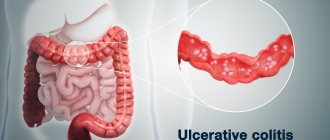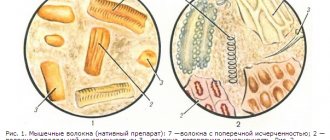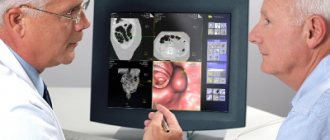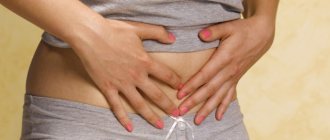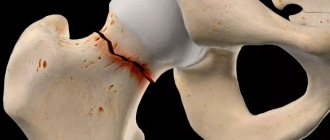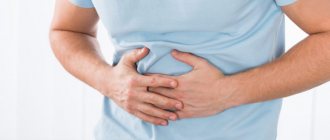Tags:
gastrointestinal diseases, colitis
5/5 — (2 votes)
Colitis is one of the most common pathologies of the gastrointestinal tract. It is an inflammatory disease of the large intestine (or rather, its mucous membrane) with pronounced symptoms , which we will talk about later. The disease can be complicated by inflammatory processes in the stomach and small intestine . It often accompanies some other acute and chronic diseases (influenza, pneumonia, typhoid, mumps, malaria, etc.).
It happens that this disease, due to similar symptoms, is confused with irritable bowel syndrome and for this reason is sometimes misdiagnosed. But since irritable bowel syndrome is not associated with the colon, then, accordingly, it cannot have anything in common with colitis.
Colitis
“Hand in hand” with dysbiosis
There are two forms of colitis - acute and chronic . In both the first and second cases, the infectious component plays a special role in the occurrence and development of the disease - most often bacterial dysentery . It can be triggered by other representatives of pathogenic microflora (for example, coli bacteria, staphylococci, streptococci, bacteria of the Proteus group, etc.). In other words, colitis goes “hand in hand” with dysbacteriosis. Inflammation can also be caused by previous intestinal infections and poor diet, as well as inadequate therapy with various medications. As practice shows, the causes of inflammation are indeed multiple. Let's summarize the main factors :
- infection in the gastrointestinal tract;
- infection with salmonella, staphylococci and other pathogenic microflora due to consumption of poor-quality food;
- the presence of worms (but not in all cases);
- inadequate, monotonous diet (mainly carbohydrates);
- allergies to certain types of food;
- chronic constipation;
- alcohol abuse;
- neglect of personal hygiene rules (for example, touching food with dirty hands);
- long-term use of certain antibiotics that can provoke dysbacteriosis;
- intoxication (poisoning with lead, arsenic and its preparations, mushrooms);
- nervous and emotional tension, stress.
Colitis ulcerosa - all Stages
Types of constipation
It is very important to classify acute and chronic constipation. In the first case, we are talking about sudden constipation - against the background of general health or exacerbation/acquisition of other diseases. Chronic constipation is diagnosed when symptoms persist for 3–6 months. The main criteria for determining constipation include the following:
- the need to strain at least in 25% of cases of defecation;
- dense, fragmented, dry feces;
- the need for manual assistance during defecation, etc.
Based on their origin, constipation is divided into many types.
Psychogenic
This type of constipation is quite easy to identify for the person himself. It occurs against the background of mental disorders and diseases: anorexia nervosa, depression, neuroses and phobias, etc. It is worth noting that constipation can also be called psychogenic when a person consciously restrains the urge to defecate, for example, avoids going to the toilet at work. False shame can lead to serious problems.
Neurogenic
This type of constipation is caused by dysregulation of intestinal motility. The condition can accompany tumors of the spinal cord and brain, previous injuries and strokes, Alzheimer's disease, etc.
Dyskinetic
Associated with intestinal dyskinesia. Muscle tone disorders can be independent and occur as a result of inflammatory diseases, pathologies of the genitourinary system, etc.
Spastic
It is a consequence of spasms of intestinal smooth muscles. It can develop against the background of stress, emotional stress and other factors.
Nutritional
This type of constipation is associated with an unbalanced diet, consumption of constipating foods, and poor drinking. Usually we are talking about a diet that is dominated by sweets, confectionery, bread, and pasta. Lack of dietary fiber leads to functional disorders. Normalizing intestinal function in this case is quite a simple matter: just review your diet and drink enough liquid.
Hypodynamic
Difficulties in defecation can occur in people who are forced to remain in bed, have a sedentary job, or lead a sedentary lifestyle. Older people are more likely to suffer from constipation.
Proctogenic
This type of constipation is associated with diseases of the rectum and anal area. The most common obstacles to normal bowel movements are anal fissures, fistulas, hemorrhoids, inflammatory diseases - proctitis, paraproctitis. In this case, constipation may be accompanied by mucous, purulent, and bloody discharge.
Mechanical
Stool retention occurs due to the fact that the movement of feces is hampered by tumors, narrowing of the lumen, and enlargement of nearby organs. This may be due to intestinal polyposis, adhesions, neoplasms and other diseases.
Endocrine
Such constipation is associated with changes in hormone levels as a result of endocrine diseases, menopause, pregnancy, and the postpartum period.
Medication
Constipation can be caused by taking medications. Painkillers, antidepressants, anticonvulsants, hormonal drugs, antibiotics, diuretics and other drugs may have this effect. The condition may resolve after stopping the medications, so you should consult your doctor about a possible treatment alternative.
There are other types of constipation - associated with intoxication, dehydration, systemic diseases, etc. Serious causes of constipation are quite rare. Usually this disorder is functional in nature. Thus, researchers Marinchuk A. T., Bogatyrev V. G. and others in their scientific work claim that “constipation in 80-90% of cases is of a functional nature, the rest is caused by reasons of an organic nature” (Marinchuk, Bogatyrev, Babieva, Kumbathiadis , 2012, p. 53). However, despite this, eliminating only one cause will not be enough. To normalize intestinal function, it is necessary to adjust your lifestyle, nutrition, drinking regimen, and daily routine.
Acute colitis: causes, symptoms, treatment
This form of the disease is caused by staphylococci, streptococci, salmonella and dysentery microorganisms . It also occurs as a result of common infections (influenza, acute respiratory viral infections, acute respiratory infections, measles), allergies or intolerance to certain medications (usually antibiotics). Often, with acute colitis, the stomach and small intestine become inflamed. As a result, according to the “domino principle,” the normal functioning of other organs of the gastrointestinal tract is disrupted. Depending on the nature of the damage to the large intestine, doctors diagnose several types of acute colitis, namely: catarrhal, ulcerative, erosive, and sometimes fibrinous .
The main symptoms include:
- cramping abdominal pain and bloating;
- the presence of mucus and blood in the stool;
- diarrhea (diarrhea).
The disease usually begins suddenly and, as a rule, with a bowel disorder. Patients feel sick and have no appetite . I am tormented by vomiting and constantly thirsty. They complain of general weakness, a sharp deterioration in health and fever . However, vomiting and diarrhea have their advantages: doctors attribute these manifestations to protective reactions. That is, in this way the body tries to get rid of the poisons that have gotten inside.
Symptoms of acute colitis may depend on the location of the inflammation. For example, when the left half of the colon is affected, pain manifests itself most sharply. Before defecation, they usually intensify and radiate to the perineum and sacrum. Stools are very frequent, up to 20 times a day (sometimes more). The stool has an uneven consistency: dense masses “float” in blood or copious mucus. The areas of the descending and sigmoid colon are painful to palpation. This is where rumbling and splashing sounds are detected.
Colitis
This symptomatology can manifest itself over several weeks and, if left untreated, the acute form usually becomes chronic. Such undesirable developments can be prevented with timely assistance.
Thus, treatment of acute colitis includes the following measures :
- drinking plenty of fluids to replenish fluid losses in the body . It is recommended to drink a specially prepared solution that is well absorbed by the intestines: add a teaspoon of salt and seven to eight teaspoons of sugar per liter of warm boiled water. You can drink mineral water and weak tea, but coffee is undesirable because it affects intestinal motility and increases diarrhea. In some severe cases, fluid is administered intravenously.
- therapeutic fasting for one to two days. Then a strict diet is indicated until the symptoms of the disease completely disappear.
- taking activated carbon. Prescribed for the absorption of toxins in the large intestine.
- taking enzyme preparations, enveloping and adsorbent substances.
- physiotherapeutic treatment.
Fight constipation
To improve bowel function, it is important to understand the causes of constipation. They can be the result of chronic diseases, eating disorders, a meager amount of fluid drunk per day, etc. Every morning stool is a kind of marker of good intestinal and body health, and a delay in bowel movements of 48 hours or more is considered constipation. Identifying the causes of the violation is the most important activity, which allows you to determine the correct tactics and correction strategy.
There are several general recommendations for improving digestion:
- Try to eat fractionally, in small portions, at the same time. Don't overeat or take long breaks from eating unless necessary.
- Choose steamed, boiled meat, poultry and fish. Limit the consumption of fatty, fried foods, smoked foods, marinades, and spices.
- Include fresh vegetables, seasonal fruits, berries, vegetable oils, and dairy products in your daily diet.
- Minimize the consumption of coffee, strong tea, rice, jelly, crackers.
- Drink at least 1.5 liters of clean water every day. Start your day with a glass of warm water. Do not drink immediately after eating - wait at least an hour.
- Keep a food diary - record symptoms after eating certain foods to find out individual reactions and adjust your diet.
To understand how to normalize the functioning of the gastrointestinal tract in an adult in a particular case and what actions can be taken specifically for you, you need to determine the type of constipation. This information will help when visiting a doctor and will simplify diagnosis.
About the causes, symptoms and treatment of chronic colitis
Chronic colitis is a disease where the leading provoking factor is the presence of infection in the gastrointestinal tract . Its manifestations are “many-faced”. It occurs in the form of periodic exacerbations. The latter occur as a result of consuming foods that irritate the colon; manifestations of allergies; long-term use of various antibiotics; general fatigue.
The main symptoms of chronic colitis include:
- cramping pain in the abdomen (but does not always occur, more often accompanying the act of defecation);
- diarrhea alternating with constipation;
- secretion of mucus (in some cases mixed with blood);
- lack of appetite;
- nausea, belching of air, unpleasant taste in the mouth;
- a feeling of heaviness and distension in the abdomen (as a result of flatulence);
- a feeling of pressure in the epigastric region (often manifests itself in connection with gastritis);
- deterioration in general health (weakness, poor sleep, headaches, irritability, depressed mood).
Chronic colitis sometimes occurs as a consequence of functional disorders of the intestines (for example, with prolonged constipation). The causes also include dyskinesia (impaired motor function), which is associated with reflex effects from the gallbladder, bladder, prostate and other organs.
The basis for the treatment of chronic colitis (regardless of its etiology) is a dietary regimen. Drug therapy is effective only in cases where the cause is clearly established. When constructing a diet, the nature of dyspepsia (putrefactive or fermentative) and the state of the pancreas and its secretory function are taken into account . A too strict diet is not needed, as there is a risk of exhaustion and the development of hypovitaminosis, which will only complicate the course of colitis.
Strict dietary restrictions are allowed only during periods of exacerbation of the disease . Then foods that irritate the intestines both mechanically and chemically are excluded . Food is consumed boiled or pureed. Meals are split (6-7 times during the day). The consumption of table salt is limited (up to 8-10 g). Allowed: non-rich meat broth, steamed cutlets from lean meats, boiled fish (also low-fat), non-acidic cottage cheese, water porridge, juices, jelly. There is a strict taboo on black bread, spicy dishes, and various smoked foods. It is undesirable to eat lard and pork, goose meat and milk, sour cream, eggs, canned food, etc. Patients prone to diarrhea should not eat cold food, and the same applies to drinking.
If chronic colitis is accompanied by constipation, then the diet must include foods to stimulate intestinal function: minced meat, boiled vegetables and fruits.
How to restore microflora
Complete diet
A person should eat a variety of foods per day, and not meager ones, consisting mainly of carbohydrates and fats. This is how most people eat, snacking, for lack of time, on fast foods, rolls, etc.. It is necessary to include fiber in the diet every day.
This:
- fresh vegetables;
- fruits;
- grain bread;
- legumes;
- greenery;
- nuts.
Orthodox fasting is useful for normalizing microflora. It has been observed that those who observe fasts suffer less from intestinal diseases, even cancer. Fasting excludes animal fats (meat, butter, eggs) and focuses on fresh vegetables and fruits, berries, and cereals.
It is known that inulin, which has a prebiotic effect, is found in the following products:
- garlic;
- onion;
- leek;
- asparagus;
- chicory;
- artichoke.
These products help improve intestinal microflora and defeat harmful bacteria. They must be included in your diet if you have intestinal problems.
Sources of bifidobacteria beneficial to humans are:
- apples;
- blueberry;
- artichoke;
- almond;
- pistachios.
They must be present on the table as often as possible.
Fermentation of products
It is useful to eat fermented ones, i.e. fermented products. As a result of the fermentation process, simple products become fantastically healthy because they change their composition thanks to bacteria. They help restore intestinal microflora.
The most common fermented products:
- sauerkraut;
- kefir;
- yogurt;
- tea mushroom.
It is customary for some peoples to ferment vegetables, even spicy ones. This dish of pickled spicy vegetables is called kimchi. Fermented soybeans are called tempeh.
Fermented dairy products contain lactobacilli, which are so necessary for normal microflora. People suffering from kidney disease simply need them, because... With such diseases, the microflora is disrupted.
Artificial sweeteners are harmful
Sugar substitutes (aspartame, saccharin) are harmful products. They have a destructive effect on the intestinal microflora. In addition, they increase blood glucose levels. Therefore, they must be excluded from the diet.
More prebiotics
Prebiotics contain beneficial bacteria that help evict harmful ones from the human intestines. They are found in vegetables, fruits, legumes, and grains. They should be eaten as often as possible. They also lower the level of triglycerides, cholesterol, and insulin in the body. This means that prebiotics reduce the risk of cardiovascular diseases, death from heart attack, and stroke.
Whole grains
The benefit of whole grains is that they contain fiber and indigestible carbohydrates, which are not absorbed in the small intestine, but enter the large intestine. There they break down and cause the growth of beneficial bacteria.
Whole grains contain:
- B vitamins;
- iron;
- zinc;
- proteins;
- carbohydrates.
They are sold whole and are also used to make whole grain bread. They are also used to make whole wheat flour.
Artificial Probiotics
There is controversy about probiotic drugs. There is evidence of some benefits that such drugs provide. But it has not been completely proven. Moreover, there are many fakes among the drugs. You need to be careful when choosing probiotics, following your doctor’s recommendations. We recommend paying attention to Maxilac.
Prevention of colitis
They say that disease is easier to prevent than to treat. Therefore, preventive measures are very important.
Prevention of acute colitis consists of following the norms of proper nutrition and a healthy lifestyle, maintaining hygiene and sanitary rules.
In the prevention of chronic colitis, special attention is paid to the prevention and timely treatment of acute colitis and especially dysentery. A large role in the prevention of diseases of the gastrointestinal tract is played by high-quality nutrition and, accordingly, maintaining the intestinal microflora in a healthy state . Not to mention the good condition of the chewing apparatus and strengthening of the nervous system.
Irritable bowel syndrome: causes and treatment of IBS, medications, diet and prevention
Table of contents
- Causes of the disease
- Symptoms of irritable bowel syndrome
- Irritable bowel syndrome in adults: women and men
- Irritable bowel syndrome in children
- Diagnostics
- Treatments for Irritable Bowel Syndrome
- Nutrition and diet for irritable bowel syndrome
- Prevention
- Advantages of contacting MEDSI
Irritable bowel syndrome (IBS) is a specific condition associated with recurrent pain, bloating, and bowel movements.
The disorder can occur with a certain frequency, spontaneously and always causes severe discomfort. Both adults and children suffer from it. How to get rid of irritable bowel syndrome? What are its true causes, how is treatment carried out? Let's look into these issues.
Causes of the disease
Psychosocial changes
Irritable bowel syndrome in women, men and children can be a consequence of depression, increased anxiety, insomnia and stress. IBS can also be caused by an unbalanced and unhealthy diet, lack of a normal rest and work schedule, lack of physical activity, overeating and chronic fatigue.
Physiological changes
They are divided into several groups:
- Biological. Disruption of intestinal microflora can lead to the development of irritable bowel syndrome. The process is triggered by both acute infections and a lack of lactobacilli and excess putrefactive deposits
- Hormonal. In women, irritable bowel syndrome can be triggered by hormonal changes during menstruation, menopause, pregnancy and breastfeeding.
- Hereditary. If IBS is diagnosed in parents, then there is a high probability that it will develop in children as well.
Symptoms of irritable bowel syndrome
The main signs of the pathological condition include regularly occurring abdominal pain.
The severity and frequency of such pain may vary. In some patients they occur every day, in others several times a week or even a month. Abdominal pain can occur after eating or regardless of food intake, only during stress or physical exertion. Moreover, patients are usually not bothered by unpleasant sensations at night. As a rule, the pain is localized in the left side of the abdomen. It is stable and rarely increases.
Pain may be accompanied by:
- Flatulence and bloating
- Feeling of intestines not being completely emptied after going to the toilet
- Too rare or frequent bowel movements
- The presence of mucus in stool, etc.
Some patients also complain of symptoms of irritable bowel syndrome that have nothing to do with the functioning of the digestive system. These include: frequent headaches (including migraines), fatigue and weakness, chest and back discomfort, difficulty breathing. Some patients additionally experience difficulty urinating.
Irritable bowel syndrome in adults: women and men
The worldwide prevalence of IBS varies from 1 to 28%. The frequency of occurrence of pathology is influenced by the place of residence. Typically, violations are recorded among residents of large cities, rather than rural areas and small towns. This is associated with the greater prevalence of various psychological disorders and the increased frequency of emotional experiences there.
In women, the pathology is more common. According to statistics, the difference is approximately 50%. That is, women with this problem visit doctors approximately 2 times more often.
Irritable bowel syndrome in children
In children, the pathology usually develops between the ages of 14 and 17 years. The prevalence of the disorder in them is no less than in adults. Functional disorders are more common in girls. In this case, the pathological condition significantly worsens the child’s quality of life. In some cases, he loses the ability to concentrate and his memory decreases. The child may even refuse to attend school.
Diagnostics
To identify a pathological condition, a gastroenterologist evaluates the clinical picture, studies the patient’s medical history, and conducts an examination. Particular attention is paid to the influence of psychological factors. For this reason, psychologists and psychotherapists are often involved in the diagnosis and further treatment of irritable bowel syndrome.
To clarify all the features of the pathology, the following is carried out:
- Clinical blood test. It eliminates infectious and inflammatory processes, as well as anemia
- Biochemical blood test. It is carried out to control metabolic disorders. The fact is that frequent diarrhea with IBS can cause electrolyte imbalance
- Scatological research. Typically, the patient undergoes stool tests for occult blood, helminth eggs, etc. This allows us to identify all possible factors that provoke the pathological condition
- Colonoscopy. The examination is carried out to assess the condition of the colon
- Irrigoscopy. X-rays are performed with a contrast agent, which makes it possible to study the condition of the intestine and identify all possible neoplasms (polyps, etc.), as well as evaluate the structure of the organ, its lumen and the elasticity of the walls
Additionally, the patient’s psychological status is assessed and the level of depression and anxiety is identified. Other laboratory and instrumental examinations may also be performed.
Treatments for Irritable Bowel Syndrome
The basis of therapy is:
- Correction of diet
- Ensuring a normal rest and work schedule
- Eliminating the main symptoms
- Achieving psychological balance
Important! Medicines are taken exclusively during an exacerbation.
Therapy largely depends on how irritable bowel syndrome manifests itself.
- IBS with diarrhea. In this case, the patient is prescribed special medications with an astringent and enveloping effect. They allow you to normalize stool. Drugs that reduce intestinal motility are also recommended.
- IBS with constipation. When treating this pathology, mild laxatives are prescribed. In this case, the goal is to enhance peristalsis and accelerate the movement of feces
- Irritable bowel syndrome with flatulence. In this case, therapy is carried out using antispasmodics and other means that normalize stool. If there is an imbalance of microflora, antibacterial drugs may be recommended
For neurasthenia, depression, increased anxiety and other psychological problems, the patient is referred to a psychologist and psychotherapist. These doctors can both conduct courses of special therapy and prescribe sedatives and antidepressants.
Nutrition and diet for irritable bowel syndrome
Establishing a proper diet can help reduce the dosage of medications used and ensure a reduction in symptoms.
The patient must adhere to a number of recommendations.
You should:
- Include a sufficient amount of boiled or baked vegetables in your grocery list. They will enrich your diet with essential dietary fiber. This diet is relevant for IBS with constipation.
- Avoid cereals and whole milk, eat rice, oatmeal and other slimy porridges with water for diarrhea
- Eliminate sugar, fresh vegetables, grapes, baked goods and sweets, alcohol and carbonated drinks from your diet. This will eliminate the problem of increased gas formation
Important! A detailed diet for irritable bowel syndrome and nutrition plan are drawn up by a doctor. They are prescribed by a nutritionist and gastroenterologist.
Prevention
To prevent symptoms of pathology, you should not only follow a diet and adhere to a certain diet, but also establish a drinking regime
. If a patient with IBS complains of constipation, he needs to drink more clean, still water.
It is important to take care of ensuring a stable emotional state
, maintaining his balance. To do this, patients learn to control reactions and master methods of complete relaxation. To reduce stress levels, it is important to maintain a proper daily routine, ensure adequate rest, and avoid excessive physical activity. Creative activities and other hobbies can help relieve emotional stress.
Regular moderate physical activity can also help overcome irritable bowel syndrome
Don't start serious training! They can make the condition worse. But regular walking and short jogging to maintain an optimal heart rate won't hurt. Swimming and yoga are also helpful.
Regular physical activity will allow you to:
- Relieve mental stress
- Improve overall emotional state
- Resist stress
- Eliminate excess weight (if any)
- Protect the body from colds
- Improve overall well-being
In addition, exercises help to form a muscle corset, which ensures correction of intestinal motility.
Important! In order to select the optimal physical activity regimen, it is better to contact a rehabilitologist or exercise therapy specialist. The training plan is drawn up taking into account the current health status and level of physical fitness of the patient. The diet for irritable bowel syndrome is also adjusted to physical activity. It is important to ensure that at least 1.5–2 hours pass between workouts and meals.
Advantages of contacting MEDSI
- Modern expert class equipment.
It allows you to quickly conduct a comprehensive examination of the patient and identify the main causes of the pathology. - Multidisciplinary approach.
Thanks to it, complex therapy is provided. Specialists eliminate not just the signs of pathology, but its causes. This allows you to forget about the problem and return to a normal lifestyle. - Treatment according to the latest recommendations.
We use both our own achievements and the international experience of our colleagues in therapy. This makes the treatment of irritable bowel syndrome both effective and safe.
To clarify the terms of service or make an appointment, just call +7 (495) 7-800-500. Our specialist will answer all questions. Recording is also possible through the SmartMed application.
